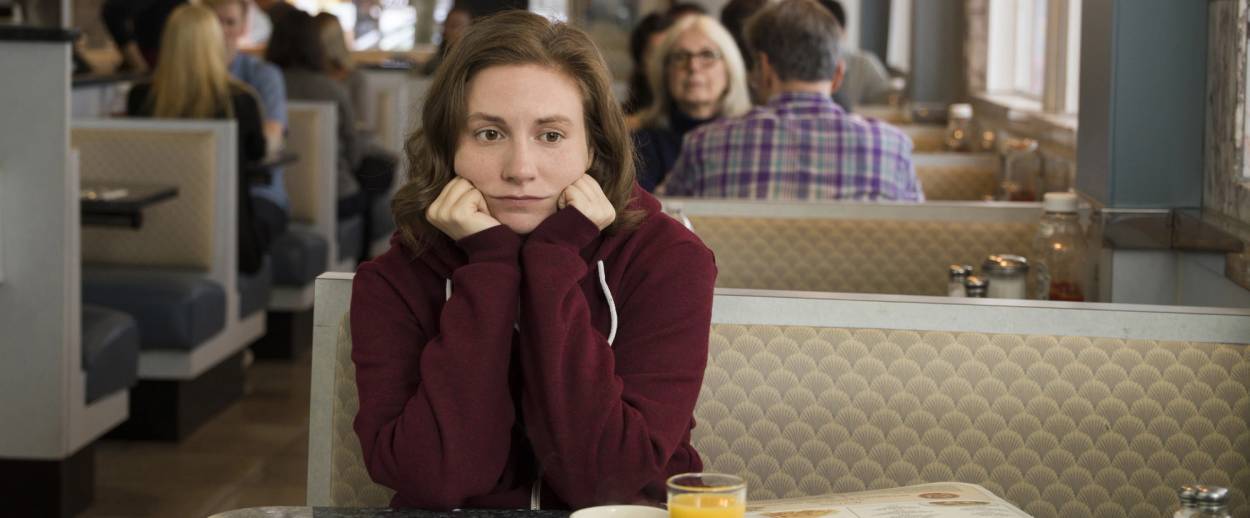Goodbye, Girls
After six seasons, the HBO series ends on an unexpectedly quiet, peaceful note




This past Sunday brought us the series finale of Girls. In the final episode, Marnie, following in the footsteps of Adam and Laird, offers her services to help raise Hannah’s baby, and Hannah actually accepts. Cut to five months later, when Hannah has had her baby. Marnie is acting predictably holier-than-thou, getting on Hannah’s nerves, and little Grover (yes, Grover), who breastfed for six weeks, suddenly won’t latch. Hannah has to start pumping breast milk (the mechanics of which inspire one of the episode’s few-and-far-between moments of pure humor: clad in her new backpack/breast-pump contraption, Hannah insults Marnie and Marnie responds with “OK, Ghostbuster”). The impetus for the argument is that Marnie has called Loreen to their upstate New York home for backup, intuiting correctly that Hannah could use the help of her own mother right now.
As Hannah struggles with the challenges of early motherhood, she adds her own Hannah-specific touch of selfishness: She sleeps late like a teenager on a weekend, leaving her friend and mother to take care of her wide-awake child. She balks when an overburdened Marnie expresses her desire to go to jazz night at a local bar, alone. She storms off for hours, giving no indication of where she’s going or when she plans to return, following an argument with her mother about—what else—her immaturity. It is only during this interlude, as she walks through her dark new suburban streets at night, that she gains some clarity—through yet another Rothian doppelganger.
This time, Hannah’s double is not an actress playing her in a low budget movie but a whiny teenage girl, clad perfectly in an Abercrombie-emblazoned T-shirt and no pants. Hannah’s mothering instincts kick in when she runs into the visibly upset, pantsless, shoeless girl; she offers the stranger her own pants and shoes and a refuge from which to call her boyfriend, before discovering that the girl isn’t running from a dangerous scenario at all, but from a demanding mother who wants her to finish her homework. Just like Hannah, the girl has irresponsibly stormed away from an argument with her mother; the difference is that the girl is not nearing 30 and is not responsible for a child of her own. Hannah’s maternal impulse takes a turn, and she shifts from heroic rescuer to scolding champion of mothers everywhere, who, she points out, “take care of you forever, even if it means endless, endless pain.” (Based just on this quick detour to guilt tripping, it seems like there might be some Jewish mother overtones in her parenting style.) At this point, I felt confident that even if Hannah wasn’t ready to be a mother, she’d get there. Even if she has adolescent impulses, she realizes what is required of her; if she’s going to be an effective or even adequate parent, she will need to stop giving in to the former.
The final episode was somewhat disappointing in a season that featured some of the show’s best writing and smartest treatment of its themes to date. It was not particularly visually appealing or dynamic, unlike the season’s premiere. It didn’t rigorously interrogate sexual politics or writerly influence, unlike the brilliant third and fourth episodes, “American Bitch” and “Painful Evacuation.” Of the main characters, it featured only Hannah and Marnie, whereas the penultimate episode allowed us to see an ensemble cast in action, and the last few episodes before it provided something like closure to the storylines of other characters like Adam, Ray, and Elijah. Frankly, it just wasn’t as fun to watch as much of the rest of the series—and, controversial wittiness and thematic relevance aside, the show’s simple potential for enjoyment, combined with its cringe-inducing and uncomfortable elements, is very much a part of what has made it such a masterpiece. But to its credit, this episode dealt with what has truly been the show’s central theme from the very start: the process of learning simultaneously to inhabit a self and look beyond that self during what can easily become a very self-centered period of life.
And in some ways, a quiet, unexciting finale is what the show needed. Hannah has left New York; that must necessarily be anticlimactic. In this sense, the quietude of the finale was exactly what the doctor ordered. Narratively, it made sense. It wasn’t fun or splashy because parenthood isn’t necessarily always fun or splashy. It felt exhausting, and Hannah has many years of exhaustion ahead of her. Hannah is moving on. Her days of frolicking in Brooklyn, going through friendship drama, halfheartedly attempting a career as a writer, and dating people while always prioritizing herself are at an end; so, too, must Girls end.
Miranda Cooper is an editorial intern at Tablet. Follow her on Twitter here.